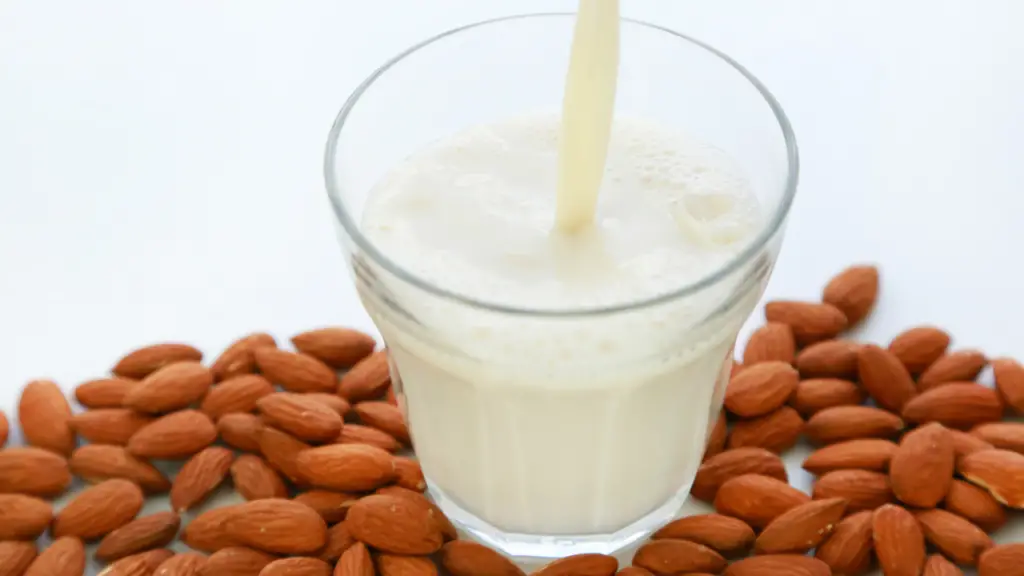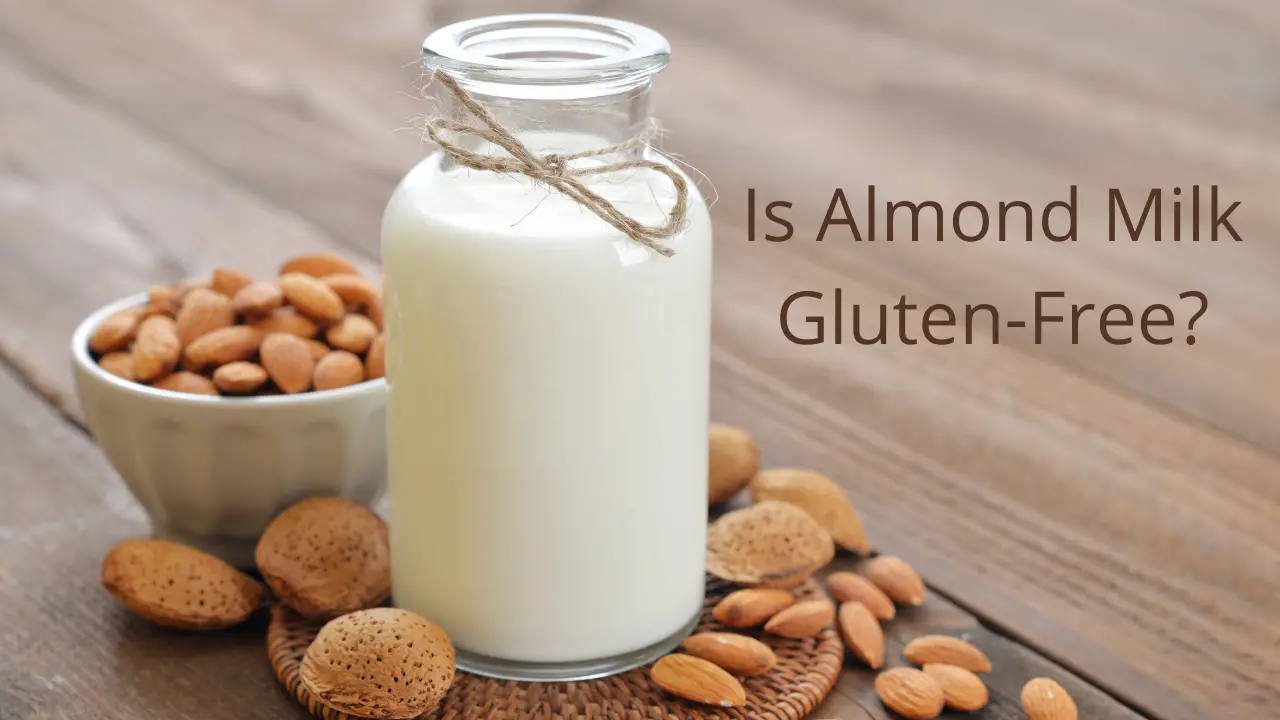Are you a fan of almond milk? You probably see almond milk more and more at your local grocery store. But why? We will discuss why it's become so prevalent. On the other hand, milk, in general, is used in numerous recipes.
It has also been consumed for decades, whether on cereal or served with cookies. Yet, not everyone is a big fan of the typical cow's milk or can tolerate it. So, milk alternatives, such as pea protein, flax milk, and hemp milk, have become the choice for many people.
But nothing is as sought after as almond milk. Gluten in almond milk is a concerning factor for gluten-free dieters. Read on to know more about whether it's safe on your diet!
What is Almond Milk?
Cereals were eaten not that long ago with cow's milk. Slowly and gradually, people started to discover different varieties of cow's milk. Some preferred whole milk, while others were a fan of skim or fat-free milk. Then, other alternatives to cow's milk started to become more prevalent.

Among those, almond milk gained unprecedented and unparalleled fame. For those who aren't aware of it, almond milk is one of the most consumed nut milk or plant-based kinds of milk in general. Its fine texture and rich taste can be achieved with a homemade version or by buying it from the grocery store.
The ingredients are simple; almond milk is made from ground almonds and filtered water. Companies add additives and thickeners to enhance the taste and increase the shelf life. Depending upon the type and the producing company, these extra ingredients can vary.
If you're making some in your home, you can use vanilla extract for a touch of flavor. Some companies have excellent unsweetened almond milk, while others have the original flavor.

The basic idea is the same. The almonds are soaked for a couple of hours before they are tossed in a blender with some filtered water. Then, this mixture is strained through a nut milk bag to remove any pulp. What you get at the end is almond milk.
History of Almond Milk
Almond milk has a rich history. It isn't something that millennials are crazy about but has been a medieval obsession. The history is fascinating. It was introduced to Southern Europe about 1000 years ago and had some importance in Christianity and Islam. It was used to replace dairy milk during Lent, as consuming it and eating meat was forbidden.
In the 14th century, an Egyptian cookery book listed detailed uses and benefits of almond milk and almonds. Some historians are adamant that almond milk is the most crucial ingredient in late medieval cuisine. Since it is easier to digest than cow's milk, it also served therapeutic purposes.
Why is Almond Milk Popular?
Just after its discovery, the tales about almond milk spread like wildfire. In next to no time, it became what everybody was talking about and what everybody was using. Studies estimated that in 2020, almond milk manufacturers in the US generated a $1.83 billion revenue. There are several reasons to explain why almond milk has become so popular. Some of these are:
Dairy-free:
With time, people have started to realize they're more allergic to various food items that they weren't aware of. They kept consuming these items, degrading the quality of their life until they realized what was triggering their symptoms.

A prime example of such a food item is dairy products. Milk contains a sugar called lactose, which can be a nuisance for people that suffer from lactose intolerance. The typical symptoms include flatulence, bloating, and diarrhea. As the name suggests, the body can't tolerate the lactose found in cow's milk.
Since almond milk is plant-based and prepared from almonds, it doesn't contain lactose. So for the people who can't consume cow's milk without experiencing digestive issues, almond milk is a great alternative. Similarly, they can use this milk to make other cereals, coffee, smoothies, and baked items. Or, basically, anything that they were previously missing out on because of the lactose.
Almond milk and a vegan diet:
Many people avoid meat and follow a strict vegetarian diet. Many people believe that animal-based products should also be avoided and consequently follow a vegan diet. Under normal circumstances, those who follow a vegan diet avoid using cow's milk and other dairy products. Since almond milk is plant-based, it is an excellent option for people following a vegan diet.
Health benefits:
Almond milk has numerous health benefits. For instance, being plant-based doesn't strip it of its nutritional content. Along with vitamin E, it contains abundant amounts of vitamin B12 along with several other vitamins and minerals. Commercially produced almond milk is diluted with water to bring the fat content down to 1 percent. Therefore it's why it's low in calories.

Unsweetened almond milk, as the name suggests, contains less sugar. As a result, it is safe for diabetic patients as it doesn't raise blood sugar. According to different studies and researches, almond milk can significantly reduce the risk of cardiovascular problems. This great nut benefits the heart.
Cosmetic industry:
The good news, almond milk is a versatile product that doesn't have only beneficial effects by drinking it. Lush, L'Occitane, and The Body Shop are all great fans of almond milk. Several of their products use almond milk as it helps in nourishing the skin. Due to its excellent moisturizing effect, some people pair almond milk with almond oil to use on their faces.
The results are astonishing as the skin becomes smooth and fine lines fade away. Moreover, the high antioxidant content prevents premature wrinkles, giving the skin a healthy and fresh look. Additionally, the hydration retention of masks and lotions is bolstered if almond milk is also used.
Almond milk and the keto diet:
According to experts, cow's milk isn't recommended for anyone on a keto diet because of the high amount of carbs. But that doesn't mean you have to miss out on milk, not with almond milk on hand. Some types of almond milk, especially the unsweetened ones, do not have added sugar. As a result, they have a pretty low carb content, making them a perfect pick for the keto diet.
Gluten & Almond Milk
Gluten is predominantly found in wheat, rye, and barley, while also being a component of certain additives and condiments. To check whether a particular item is gluten-free or not, you need to make sure of two things.

The first thing to be checked is whether that food item contains a source of gluten or not. Naturally, all of the ingredients that are used to make almond milk are gluten-free. All fruits, vegetables, and nuts do not contain gluten or water, for that matter. But sometimes, certain additives are used by some companies that commercially produce almond milk.
Yeast extract, some natural flavors, and rice syrup can be the hidden source of gluten in your almond milk. In addition, some brands also mix other plant-based milk. If cashew or coconut milk is blended with almond milk, there's no risk of contamination.
Contamination Risks to Watch For:
If rice milk, oat milk, or soy milk are mixed with almond milk, it is likely to trigger the symptoms of a celiac patient. Check the food label to make sure there's no ingredient made from wheat, barley, or rye.
Even if you're sure that all the ingredients are naturally gluten-free, there's still the risk of cross-contamination. If a gluten-free item comes in contact with a gluten-containing item, consuming that item will be hazardous for a celiac patient.
You can't put the almonds you're about to use in a container that previously stored a gluten-containing food, either. Similarly, a cooking utensil used to make a food that has gluten can't be used for making almond milk.
So, if you're making almond milk at home, make sure you use gluten-free ingredients and avoid cross-contamination. Otherwise, if you're buying almond milk, look for a label saying gluten-free. Gluten-free labeled products are certified by the FDA and contain gluten in an amount less than 20ppm.
Gluten-Free Almond Milk Brands
Shelf-stable milk is created by using a process of UHT (ultra-high temperature.) It allows the milk to sit on the shelf, unrefrigerated for about three months. Not all brands commercially producing almond milk sell gluten-free products.

Some use gluten-containing ingredients or additives. Meanwhile, others don't take precautions to prevent cross-contamination. Here is a list of gluten-free brands of almond milk.
Malk Unsweetened Pure Almond Milk:
Only three ingredients are used to make Malk Unsweetened Pure Almond Milk, and all of them are naturally gluten-free. These are organic almonds, Himalayan salt, and filtered water. Additionally, they also bear a certified gluten-free label and avoid using added sugar.
Califia Farms Organic Almond Homestyle Nut Milk:
This brand is also certified by the FDA to be gluten-free, so you don't have to worry about cross-contamination. As for the ingredients, they use almonds, cashew, macadamia, and coconut cream. No emulsifiers are used, and the brand is also against the use of added sugars and carrageenan.
Simple Truth Organic Unsweetened Almond Milk:
Many gluten-free brands are more affordable than Simple Truth Organic Unsweetened Almond Milk. This brand has done something about the low Vitamin A and D content, unlike various other gluten-free choices, by adding it to their milk. This gluten-free almond milk is a healthy choice since it is fortified. It is also devoid of any added sugar.
Silk Unsweetened Original Almond Milk:
With only 30 calories per cup, this almond milk is also certified to be gluten-free by the FDA. What's more is, this almond milk is also fortified to match the nutritional content of cow's milk. This company also prohibits the use of carrageenan and added sugars.
Almond Dream:
The company has affirmed that all of its products are tested and contain less than 20ppm of gluten. They also avoid the use of the controversial barley-based enzyme that Rice Dream uses. There are four different types of almond milk: Original, Vanilla, Unsweetened Original, and Unsweetened Vanilla.
Pacific Foods:
Pacific Food also makes hazelnut and coconut milk in addition to almond milk. A unique fact about Pacific Food's almond milk is it's organic on top of being tested gluten-free. The different varieties of almond milk include Original, Unsweetened, Chocolate, and Vanilla.
So Delicious Organic Unsweetened Almond Milk:
Although this almond milk isn't fortified with minerals or vitamins, it's free from carrageenan. It also has a gluten-free label to validate that all the ingredients are gluten-free and there's no risk of cross-contamination.
New Barn Unsweetened Almond Milk:
This unfortified almond milk is free of added sugars and carrageenan. This brand uses organic almonds, sea salt, organic acacia gum, and filtered water to make its gluten-free product.
Other Possible Reasons for Symptoms
If you're a celiac patient, gluten-free almond milk is least likely to trigger your symptoms. But some people feel discomfort even after using gluten-free almond milk. Causes of why that might be happening are:
Extra sensitivity:
Some people are more sensitive to gluten than other celiac patients. Typically, if the gluten levels are below 20ppm, they don't trigger the symptoms. But occasionally, someone might feel abdominal pain and digestive discomfort after consuming almond milk. The reason behind this is, their body can't tolerate even 19ppm of gluten. Therefore, they can have a severe reaction even to gluten-free foods.
Harmful additives:
Celiac patients who also suffer from lactose intolerance can't consume cow's milk without experiencing horrible symptoms. But even gluten-free almond milk can flare up the symptoms. Their stomach lining becomes damaged, which leads to abdominal pain, discomfort, and bloating.

A few almond milk brands use certain additives that cause digestive distress. The most potent among these additives is carrageenan. It has zero nutritional value and is indigestible. Within a few hours of consumption, it can cause severe pain, bloating, and other gastrointestinal issues.
Since these symptoms resemble celiac disease symptoms, they might be mistakenly interpreted as a reaction to gluten. Guar gum, gellan gum, and sunflower lecithin are also responsible for triggering similar symptoms in some people.
Therefore, it has been advised to stay away from any emulsifiers added to plant-based milk. Also, be cognitive of vegetable oils that may be added to any dairy-free milk.
Final Words
So we conclude that almond milk is a gluten-free dieter's best friend, especially if they're lactose intolerant too. Just be wary that the brand you're going for is healthy and doesn't include tons of harmful additives.
Preferably purchase gluten-free brands over blindly grabbing the first one you see at a grocery store; they're not always gluten-free. Here is a basic recipe for homemade almond milk.
Lastly, enjoy a healthy and happy gluten-free life with almond milk by your side!

The owner of this website, HealthYeahLife.com is a participant in the Amazon Services LLC Associates Program, an affiliate advertising program designed to provide a means for sites to earn advertising fees by advertising and linking HealthYeahLife.com Review to Amazon properties including, but not limited to, amazon.com.





